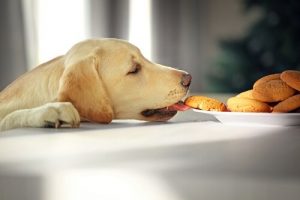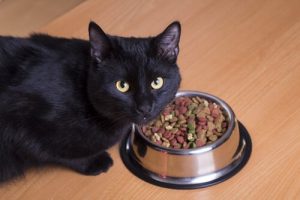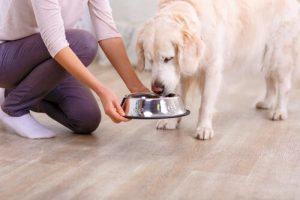What Can You Feed Your Pets at Christmas?


Written and verified by the lawyer Francisco María García
These days, Christmas is associated, in many homes, with huge meals and eating too much. It’s important to avoid overeating and consuming too many high-calorie foods, like sweets, fatty meats, alcoholic drinks, sugary drinks, etc. Find out what you can feed your pets at Christmas.
At Christmas pets are also drawn to eat a lot of the food that we cook at home. In particular, dogs won’t stop circling the kitchen and begging for food, which many owners tend to give them, be they left-overs or their own food.
Good habits with pets at Christmas

Using leftovers from large meals to feed your pet at Christmas is not healthy or good for them.
Pets eat everything. The things we like most, they also tend to like a lot. But offering your pet a Christmas pudding, shortbread, or marzipan is not a very good idea.
They already have their own sweets, which you can find in specialist shops. You can of course allow your pet to join you at Christmas dinner. But it will be best for them to have their own special sweets, candies adapted for them.
When it comes to meat stews, some Christmas recipes can be dangerous for cats and dogs. They can cause indigestion, or your animal might choke on a bone.
Christmas menu for pets. Grapes at New Year?
In some cultures, grapes are the ideal fruit to say goodbye to the year, but not for dogs. It’s been shown that they can affect the functioning of their kidneys.
Shellfish
The shell and peel from shellfish contain a substance called chitin which dogs can’t digest well. It’s been shown to cause vomiting, diarrhoea, and constipation.
Chocolate is toxic for your pet
Chocolate bears many great health benefits for humans. It’s found in many cakes and Christmas desserts. But it’s not advised for dogs. It contains a substance called theobromine, which turns out to be toxic for them.
Onions and garlic
Onions contain a component (thiosulphate) which destroys a dog’s red blood cells. The potential consequences for your pet’s health, particularly if they’re ill or very old, are anaemia, weakness, and respiratory problems.
The food you buy for your pets don’t contain onion, but the leftovers you might offer surely will.
Equally, garlic, present in many Christmas dishes, also turns out to be harmful for dogs. Dogs don’t have a good enough digestive system to metabolise garlic properly. If they eat it, it’s poisonous for them.
Alcohol, risks for your pets at Christmas
Champagne and wine are very common at the dinner table at Christmas time. It’s important to be careful if there are animals at home.
All alcohol is harmful and poisonous for dogs, including in small quantities. It does their diet no good at all.
Nuts
Nuts are a very complex food for a dog to digest. Even if crushed, dogs can’t digest them well.
Bones
Bones left over from a Christmas roast should never be given to a dog. However, one exception is the knee cap of a cow which has been well cooked. Anything else could cause intestinal perforation, diarrhoea, and constipation.
Coffee and tea
Caffeine and stimulants in these drinks make them not recommended for animals at home.
Christmas leftovers

Sometimes dogs at home become some sort of rubbish bin for food. To save on some of their daily food, people use leftovers from Christmas dinner.
However, you shouldn’t forget that dogs have specific nutritional needs. Their health depends on not giving them leftovers of foods that can cause serious gastrointestinal problems.
With a little imagination and the right food for them, you can make a rich Christmas diet for your pet. This way you can celebrate this wonderful time of year alongside them.
These days, Christmas is associated, in many homes, with huge meals and eating too much. It’s important to avoid overeating and consuming too many high-calorie foods, like sweets, fatty meats, alcoholic drinks, sugary drinks, etc. Find out what you can feed your pets at Christmas.
At Christmas pets are also drawn to eat a lot of the food that we cook at home. In particular, dogs won’t stop circling the kitchen and begging for food, which many owners tend to give them, be they left-overs or their own food.
Good habits with pets at Christmas

Using leftovers from large meals to feed your pet at Christmas is not healthy or good for them.
Pets eat everything. The things we like most, they also tend to like a lot. But offering your pet a Christmas pudding, shortbread, or marzipan is not a very good idea.
They already have their own sweets, which you can find in specialist shops. You can of course allow your pet to join you at Christmas dinner. But it will be best for them to have their own special sweets, candies adapted for them.
When it comes to meat stews, some Christmas recipes can be dangerous for cats and dogs. They can cause indigestion, or your animal might choke on a bone.
Christmas menu for pets. Grapes at New Year?
In some cultures, grapes are the ideal fruit to say goodbye to the year, but not for dogs. It’s been shown that they can affect the functioning of their kidneys.
Shellfish
The shell and peel from shellfish contain a substance called chitin which dogs can’t digest well. It’s been shown to cause vomiting, diarrhoea, and constipation.
Chocolate is toxic for your pet
Chocolate bears many great health benefits for humans. It’s found in many cakes and Christmas desserts. But it’s not advised for dogs. It contains a substance called theobromine, which turns out to be toxic for them.
Onions and garlic
Onions contain a component (thiosulphate) which destroys a dog’s red blood cells. The potential consequences for your pet’s health, particularly if they’re ill or very old, are anaemia, weakness, and respiratory problems.
The food you buy for your pets don’t contain onion, but the leftovers you might offer surely will.
Equally, garlic, present in many Christmas dishes, also turns out to be harmful for dogs. Dogs don’t have a good enough digestive system to metabolise garlic properly. If they eat it, it’s poisonous for them.
Alcohol, risks for your pets at Christmas
Champagne and wine are very common at the dinner table at Christmas time. It’s important to be careful if there are animals at home.
All alcohol is harmful and poisonous for dogs, including in small quantities. It does their diet no good at all.
Nuts
Nuts are a very complex food for a dog to digest. Even if crushed, dogs can’t digest them well.
Bones
Bones left over from a Christmas roast should never be given to a dog. However, one exception is the knee cap of a cow which has been well cooked. Anything else could cause intestinal perforation, diarrhoea, and constipation.
Coffee and tea
Caffeine and stimulants in these drinks make them not recommended for animals at home.
Christmas leftovers

Sometimes dogs at home become some sort of rubbish bin for food. To save on some of their daily food, people use leftovers from Christmas dinner.
However, you shouldn’t forget that dogs have specific nutritional needs. Their health depends on not giving them leftovers of foods that can cause serious gastrointestinal problems.
With a little imagination and the right food for them, you can make a rich Christmas diet for your pet. This way you can celebrate this wonderful time of year alongside them.
This text is provided for informational purposes only and does not replace consultation with a professional. If in doubt, consult your specialist.








